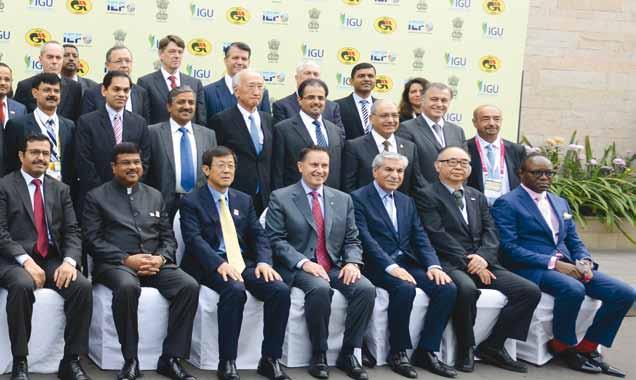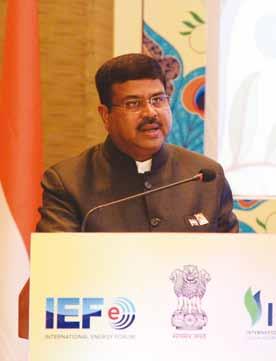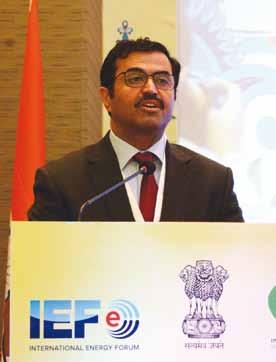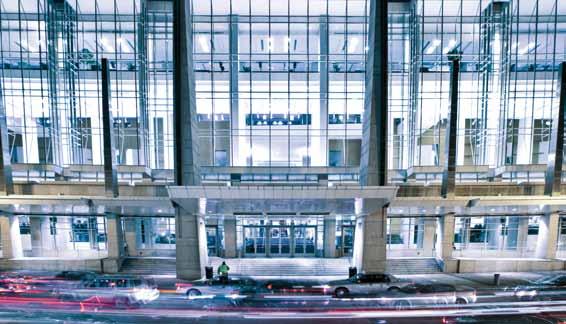
7 minute read
5th IEF-IGU Ministerial Gas Forum, New Delhi
by IGU
By Anette Sørum Nordal
x The IEF-IGU Ministerial
Gas Forum provides a platform for industry and government figures to discuss the most pressing concerns that affect both industry and society in relation to natural gas.
The biannual IEF-IGU Ministerial Gas Forum is an important cooperation between IEF and IGU. It was first held eight years ago, and in December 2016, the 5th IEF-IGU Ministerial Gas Forum took place in New Delhi, India.
This by-invitation-only event brings government officials and the gas industry together tto discuss the current issues facing the gas industry. It is one of a few events where gas industry players do not only talk among themselves but invite and go into dialogue with policymakers and regulators, in addition to other international organisations. As the IGU Secretary General, Luis Bertrán Rafecas, expressed during the event, “It is a great opportunity to promote gas as a source for the sustainable future energy mix.”
This 5th IEF-IGU Ministerial Gas Forum was organised in cooperation with the government of India with support from GAIL (India) Limited, IGU Charter member, and the Natural Gas Society of India, IGU Associate member, on December 6, 2016 in New Delhi. It was not by coincidence that New Delhi was chosen as a backdrop. The Indian government is taking several measures that can increase the share of natural gas in the country’s energy mix and move its economy to a gas-based one. The government is planning to expand India’s natural gas import infrastructure in the years to come and is also taking measures to increase the demand side. As a consequence, gas’s share in the Indian energy mix is expected to increase in the medium and longer term.
Gas for growth
The topic of the 5th IEF-IGU Ministerial Gas Forum was ‘Gas for growth: improving economic prosperity and living standards’, aiming to better understand the “current state of play in the gas industry and how the gas industry sector can contribute to a sustainable growth and secure the energy future”. These are hot topics for both the industry and governments. Climate change is high on the agenda and carbon reduction targets must be met but at the same time growth in world population and rising living standards will result in increased energy demand. Urban air quality is also a great concern and countries and cities are taking on local air quality initiatives.
Current state of the industry
Abundant supply is a key characteristic of the gas industry right now. This brings both opportunities and challenges for the gas industry. LNG production has increased and at the same time demand growth has been weaker than

expected. Gas prices are currently low across all markets due to increased supply, but also the decline of the oil price. A key question at the Ministerial Gas Forum was the role that gas occupies in this oversupplied market and in a world that faces multiple challenges with regards to sustainability.
IEF’s YouTube channel interviewed some of the most central Forum delegates at the event. In the Q&As, the delegates agreed on the IEF-IGU Ministerial Gas Forum’s success and importance. The conclusion seemed to be clear: the future of natural gas is still looking bright, although there are also challenges to overcome.
A bright future
A bright future for natural gas is supported by projections on the future energy mix, something that was referenced in the presentations of the Forum and in the IEF interviews.
According to the IEA, gas is the only fossil fuel set to increase its share in the primary energy mix by 2040. Even in its 2°C scenario,
v HE Shri Dharmendra
Pradhan, India’s Minister of State for Petroleum and Natural Gas gave opening remarks to the Forum.
vv IGU Wise Person Nobuo
Tanaka highlighted the importance of discussion with both consumers and producers.

the IEA expects the gas market will grow, as does the Gas Exporting Countries Forum (GECF). According to GECF's Global Gas Outlook, global demand for gas is likely to increase by 50% between 2015 and 2040 with the share of gas in the energy mix increasing from just over 21% in 2015 to 25% in 2040.
The reasons for this increase in natural gas use are its environmental advantages in comparison to other fossil fuels and its possibility to partner with and support renewable energy sources. “When used in place of higheremitting coal and oil, natural gas cannot only help reduce global greenhouse gas emissions but also improve air quality and provide access to affordable and clean energy in rich and poor countries alike,” as the IGU background paper for the event stated.
Furthermore, natural gas is available and gas markets are becoming increasingly interconnected. The so-called ‘second gas revolution’ – to quote the IEA – is ongoing and involves a wave of LNG capacity that has come on stream. As stated in the IGU background paper: “…lowcost floating regasification technology allows

a growing number of countries to quickly tap into the global LNG trade. Thanks to an unprecedented wave of investment in new LNG export capacity, the rapid expansion of global gas trade is set to continue to 2020 and beyond. The gas market has entered a period of abundance with lower gas prices across the main importing regions. To benefit from a buyer’s market, prospective natural gas importers will have to invest in new infrastructure, including regasification terminals, pipelines, electricity networks and gas-fired power plants.”
Challenges facing natural gas
At the same time, the new gas revolution brings with it challenges, and the bright projections for the fuel can only become a reality if these are dealt with. The abundant supply, together with weaker than expected demand growth, has also led to oversupply.
IGU Wise Person Nobuo Tanaka, the former IEA Executive Director and currently President of the Sasakawa Peace Foundation, highlighted in his interview with IEF that it is important
that the discussion on how to deal with this is undertaken with both consumers and producers. He characterised this bilateral discussion as the key to bringing an agreement to oversupply. “Certainly, having better information for both consumers and producers is defini-tively necessary,” said Nobuo. “It is not easy to share the whole information but general discussions [are needed] about the direction of the market and how we contribute to better pricing, better security and better sustainability for the future.”
The oversupply and decline in gas prices naturally affects investment. The Minister of Energy & Industry of Qatar, HE Dr Mohammed Bin Saleh Al-Sada, said in his keynote speech that with the expectations of strong demand growth for natural gas, there are many challenges in terms of capital investment for the gas supply industry.
“LNG prices have fallen dramatically during the last couple of years following the path of the oil market. Under this uncertain environment, the industry has no other alternative but to curtail investment and take measures to reduce costs. This in turn negatively impacts the development of future projects. As a result, as markets recover, the energy requirements will not be available to meet the forecasted growth.”
The need to secure investments and how to ensure a predictable investment environment was a major concern at the Forum. As stated in the IGU background paper: “To continue to play a prominent role in the future energy mix – and contribute to a more sustainable energy future – natural gas requires a balanced playing field from policy.”
The same background paper highlights four policies that could accelerate the growth of natural gas in the coming decades: ◆
A strong and predictable carbon price signal would support gas (and zero carbon energy sources) against higher carbon-emitting fuels in most major economies around the world.
At the minimum, a strong carbon price must

be taken into account in government policy decisions. Continuing market reforms could ensure that gas supply and demand responds to clear and transparent market price signals, and that natural gas is traded in an increas-ingly deep and liquid global market (much like crude oil). Japan’s recent deregulation efforts illustrate the type of changes needed to create more competitive domestic gas and power markets. Continued support for free trade in LNG remains critically important to enable gas to flow freely around the world, especially in the face of growing calls for protectionism on both sides of the Atlantic. The industry would benefit from a more stable and predictable regulatory approach, especially for unconventional gas production, which is increasingly controversial and the target of environmental opposition from the United States and United Kingdom to Colombia and China.
Anette S Nordal is IGU Information Consultant and Secretary of the Coordination Committee.
c HE Dr Mohammed Bin










